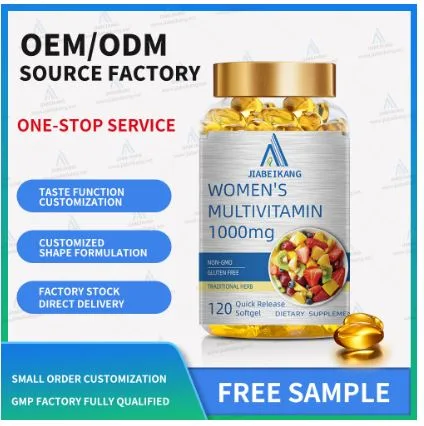Top 10 Essential Supplements for Everyday Wellness
The human body needs to consume more than 40 kinds of nutrients every day, but the current dietary structure makes it is difficult to meet the normal nutritional needs of the human body from food alone. Regulating the nutritional balance in the body through dietary nutritional supplements can improve nutritional deficiencies, such as sub-health and hidden hunger, that are threatening humans.
The dietary supplement market continues to expand, with growth rates varying across regions, driven by consumer demand and health awareness. In developed countries and regions, market growth is stable due to consumers’ increased awareness of healthy foods and supplements. In developing countries, however, the market is growing rapidly due to rising health awareness and improved living standards. To meet diverse consumer needs, product innovation is constantly underway in the dietary supplement market. Companies like Jiabeikang specialize in private label supplements and offer ODM/OEM dietary supplement solutions. They cover a wide range of dosage forms and provide integrated services encompassing R&D, production, packaging, and quality control.
Here are the Top 10 Essential Supplements for Everyday Wellness. Through this article, you can learn about 10 common dietary supplements that the human body needs.
Vitamin D
Vitamin D is calcium’s “golden partner.” Its core function is to regulate calcium and phosphorus metabolism in the body. Like a key, it helps the body absorb and utilize calcium, thereby strengthening bones and healthy teeth. A vitamin D deficiency can impair the body’s calcium absorption and utilization, potentially causing kyphosis, osteomalacia, and even increasing the risk of osteoporosis in the long term.
In addition, studies have found that vitamin D deficiency may increase the risk of infection and immune-related diseases. For example, decreased vitamin D levels in obese children are a contributing factor to the development of hyperuricemia.
Supplementing 1200 units of vitamin D is beneficial to the rehabilitation of children with global developmental delay (GDD) and can reduce the occurrence of adverse events during the rehabilitation period. Vitamin D is not only a “bone guardian” but also an important support for children’s overall health.
Multivitamins
A multivitamin combines several vitamins and minerals in a single product. It’s a mixed preparation of multiple vitamins, including vitamin A, B vitamins (including vitamins B1, B2, B6, and B12), vitamin C, vitamin D, and vitamin E. It may also include minerals like calcium, phosphorus, magnesium, zinc, and selenium. It has a wide range of benefits, supplementing multiple vitamins simultaneously to meet the body’s multivitamin needs. It helps prevent and treat various conditions caused by vitamin deficiencies, such as malnutrition, anorexia, beriberi, and pellagra. It also promotes metabolism, boosts immunity, and supports healthy vision, bones, cardiovascular health, nervous system health, and skin health. It’s suitable for those with an unbalanced diet who are prone to multivitamin deficiencies, such as pregnant and lactating women, children, and the elderly.
Lutein
Lutein is a nutrient that can be obtained from the diet. For example, kale, spinach, broccoli, carrots, pumpkin, goji berries, and egg yolks all contain high levels of it.
Lutein is the main pigment in the macula of the retina at the fovea, which is the area where our vision is most acute.
Lutein cannot be synthesized in the body, meaning that if it is not continuously obtained from the diet, it will lead to a lutein deficiency in the body. Lutein has the effects of anti-oxidation and absorbing blue light.
Omega-3 Fish Oil
Fish oil, as the name suggests, is oil extracted from fish. It’s popular because it’s rich in omega-3 fatty acids (also known as n-3 fatty acids), the most well-known of which are EPA and DHA.
EPA (eicosapentaenoic acid): Often referred to as a “blood vessel scavenger,” some studies suggest it can lower triglyceride levels in the body and is beneficial for regulating blood lipids.
DHA (Docosahexaenoic acid): This is more commonly known as “brain gold.” Claims that it can make children smarter are a bit exaggerated. However, DHA is indeed a crucial component for the growth of nervous system cells. It is found in significant proportions in the cerebral cortex and retina, playing a crucial role in the development of intelligence and vision in infants.
Magnesium
Magnesium glycinate is a magnesium supplement with potential health benefits, including relieving anxiety, supporting bone health, controlling blood sugar, and improving sleep. Magnesium is a mineral found in foods such as legumes, seeds, and vegetables.
It’s involved in over 300 biochemical reactions, including regulating the body’s stress response. A balanced diet can meet magnesium needs. Some people need magnesium supplements to meet daily needs and maintain optimal blood levels.
Magnesium glycinate and magnesium citrate are two magnesium supplements that have different uses. Both can increase magnesium levels in the body.
Magnesium glycinate is often used to improve sleep, reduce anxiety, and support bone health, while magnesium citrate is often used to treat constipation and improve digestion and bowel regularity.
Compared to magnesium citrate, magnesium glycinate is less likely to cause stomach problems, such as diarrhea. Talk to your healthcare provider about choosing the right magnesium supplement for you. Magnesium glycinate and magnesium citrate are two different magnesium supplements with different uses. Both can increase magnesium levels in the body.
Calcium
Calcium is the most abundant mineral in the human body (accounting for 1.5%-2.0% of body weight). 99% of it is present in bones and teeth, forming a scaffold and serving as a calcium reservoir; the remaining 1% is in body fluids and soft tissues, maintaining a dynamic balance with bone calcium.
Calcium is key to bone health, but calcium in bones is irreversibly lost with age. Long-term calcium deficiency is like a deficit in your bank account, which can lead to bone diseases.
Calcium carbonate is currently the most widely used calcium supplement, offering advantages such as high calcium content, minimal side effects, and low price. It is also now available in combination with vitamin D3. The calcium ion content of calcium carbonate can reach up to 40%, making it an ideal calcium supplement. However, calcium carbonate’s decomposition relies on stomach acid, which can affect digestion. Improper administration can cause digestive issues such as belching, constipation, bloating, and even nausea and vomiting.
Protein Powders
Protein is an important raw material for building body cells and can also help repair damaged tissues such as muscles, skin, bones, and hair. The main ingredient of protein powder is one or more high-quality proteins. We are all familiar with protein. It is one of the three major nutrients of the human body, along with fat and carbohydrates. It is the most important nutrient that makes up the human body and affects human metabolism.
Initially, protein powder was mainly used by athletes to maintain their weight and enhance their athletic ability. However, with continuous research, protein powder has expanded to the general public as a nutritional health product.
In addition to replenishing energy and promoting growth and development, studies have also shown that soy protein can reduce the risk of cardiovascular disease, and whey protein helps synthesize muscle.
Probiotics
Probiotics don’t refer to any specific bacteria, but rather a general term for a class of active microorganisms that are beneficial to the human body. These bacteria are numerous and diverse in nature, with varying functions. For example, Lactobacillus acidophilus and Bifidobacterium, commonly found in yogurt, and Streptococcus salivarius, found in the human mouth, are all considered probiotics. Furthermore, probiotics also include prebiotics (soluble dietary fiber that promotes the growth of probiotics), synbiotics (a combination of probiotics and prebiotics), and postbiotics (beneficial substances produced by the metabolism of probiotics).
Collagen
Collagen is a protein found in the human body. It is a component of skin, nails, and hair, and is an important component of cartilage. Collagen provides support for skin, bones, and muscles, maintaining skin firmness and promoting healthy joint function.
There are 28 types of collagen, with five main types. Most collagen supplements are made using types I, II, and III.
Type I collagen: This is the most common type of collagen in the body, making up over 90% of the body’s collagen. It’s found in skin, teeth, bones, and ligaments. Type I collagen supplements are typically sourced from fish, but can also come from cows.
Type II collagen: Found primarily in cartilage, it’s essential for joint health. Type II collagen supplements contain collagen from both chicken and cow sources.
Type III collagen: Found primarily in muscles and blood vessels. It’s thought to support the production of type I collagen in the skin and other connective tissues. Type III collagen supplements are typically derived from bovine and porcine sources.
Type IV collagen: Found primarily in the skin. It helps with wound healing and kidney function. It’s not typically found in supplements.
Type V collagen: Found primarily in hair and the placenta, it also works alongside type I collagen. It’s also not found in supplements.
Zinc
Zinc is a chemical element that is abundant in the Earth’s crust and is also an essential trace element for the human body. However, our body cannot synthesize zinc on its own, and we usually obtain it through our daily diet.
Zinc is crucial for maintaining normal immune system function. It promotes the development and function of immune cells, directly inhibits viral replication in the body, and strengthens our defenses against viral and bacterial invasion. It also plays a role in maintaining the integrity of epithelial tissue, including the skin and reproductive system.
The Importance of Standardizing Quality Standards for Dietary Supplements
Provide safety to the public
The primary advantage of high-quality dietary supplements isn’t effectiveness, but safety. From raw materials and production processes to finished product inspection and formulation, rigorous procedures and control standards are in place. As a result, safety far exceeds that of ordinary foods. However, low-end products aren’t always as safe, not to mention the risk of counterfeit goods. Jiabeikang maintains a rigorous and standardized production process, with strict quality control at every step, from raw materials to finished product. Their professional certifications and advanced private label supplement production methods provide consumers with confidence when ordering.
Helps the public understand the criteria for identifying quality
The market is already flooded with numerous products claiming to be high-quality. Applying rigorous criteria, we must carefully distinguish between exaggerated claims and those with reliable evidence. This allows us to identify truly high-quality dietary supplements and avoid being deceived by counterfeit products. Educating the public about quality standards is an important component of public nutrition education.
Helps consumers choose the products they want
High-quality dietary supplements are undoubtedly the first choice for those pursuing the highest quality of health, but that doesn’t mean mid-range and low-end products are completely ineffective. Just like buying a car, you can drive high-end, mid-range, and low-end cars. It’s just that those who prioritize quality and safety tend to prefer high-end vehicles. The public should clearly understand that not all products are created equal; there are definitely different grades. This allows everyone to choose the product that suits their needs. Furthermore, high-end products aren’t necessarily expensive; due to their wider variety of ingredients, they often offer a better value for money. Conversely, some low-end products are sold at exorbitant prices through misleading advertising. Understanding how to distinguish quality can help you avoid being deceived.
Helps accelerate the development of the entire dietary supplement (health care product) industry
If the public has more objective criteria for distinguishing the quality of dietary supplements, it will drive the upgrading of the entire dietary supplement industry. Companies that insist on improving quality will achieve great development, while those that linger in the low-end market or even produce counterfeit and shoddy products will find it difficult to survive.
Smart Manufacturing Upgrade: The Innovative Path of OEM/ODM for Private Label Supplements
OEM: The brand owner (client) provides the design, and the brand belongs to the brand owner. The profit is lower and the risk is higher. The core capabilities required are production efficiency and quality control.
ODM: The manufacturer independently designs, and the brand owner can modify it. Usually, the brand of the client is used (the design can be resold). It has a medium profit and medium risk. The core capabilities require design, R&D, and production capabilities.
OEM/ODM Advantages
Reduce investment costs and risks
Investors in the cooperative model do not need to invest in factory construction, purchase production equipment, etc., which greatly reduces the company’s initial operating and investment costs.
Mature product creation model
With mature R&D, design, proofing, and large-scale production processes, we can ensure the formality of our products, the completeness of our qualifications, and guarantee the high quality and consistency of our products.
Focus on brand promotion and market expansion
Diversified sales channels and perfect after-sales service.
Professional collaboration/resource sharing
Manufacturers have mature supply chain networks and technical teams that can help companies obtain more resource support and professional collaboration opportunities to further reduce costs and increase efficiency.
With OEM/ODM services, companies can launch proven formulas or completely customized products. Whether it’s capsules, gummies, drops, or powders, this flexibility allows brands to innovate quickly and stay ahead of market trends. Product innovations that meet consumer needs, like the top ten supplements listed above, play a vital role in maintaining health and vitality.
Conclusion
For people with common nutrient deficiencies, abandoning dietary supplements out of concern for adverse reactions from excessive use is akin to throwing the baby out with the bathwater. On top of a balanced diet, the rational use of high-quality, complex dietary supplements is undoubtedly a wiser choice, as those with lower baseline nutrient levels are more likely to benefit from private label dietary supplements than those with higher baseline nutrient levels.




